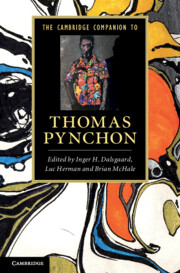Biographical note
Published online by Cambridge University Press: 28 March 2012
Summary
Thomas Pynchon has so carefully guarded his privacy that relatively little is known about his personal life. He evidently prefers to have readers focus on his fiction. His principled determination to avoid personal publicity has led to his routinely, and inaccurately, being described as a recluse, has sparked some bizarre rumors – that he was J. D. Salinger, or the Unabomber – and has provoked some spiteful and some self-serving revelations. Now in his seventies, Pynchon seems to have let down his guard a bit, perhaps as the effect of being a family man with a teenage son. In 2004, he mocked his own reputation as a “reclusive author” by allowing himself to be represented in two episodes of The Simpsons as a figure with a brown paper bag over his head, voicing the caricature himself. In 2009, he even narrated a short promotional video for his latest novel, Inherent Vice.
Pynchon’s ancestors can be traced back nearly a millennium, to the time of the Norman Conquest of England. His earliest ancestor in America, William Pynchon (1590–1662), born into the modestly landed English gentry, joined the Great Migration of Puritan s to New England in 1630. A member of the Massachusetts Bay Company and treasurer of the Bay Colony, William Pynchon was a founder of both Roxbury and Springfield in Massachusetts. He was a successful merchant and fur trader, a magistrate and an amateur theologian. But he returned to England in 1652 after stirring up controversy by writing The Meritorious Price of Our Redemption (1650), a book which Massachusetts authorities judged heretical and ordered burned in the Boston marketplace because of its subversive political, as well as theological, implications.
- Type
- Chapter
- Information
- The Cambridge Companion to Thomas Pynchon , pp. 9 - 16Publisher: Cambridge University PressPrint publication year: 2011
- 1
- Cited by

